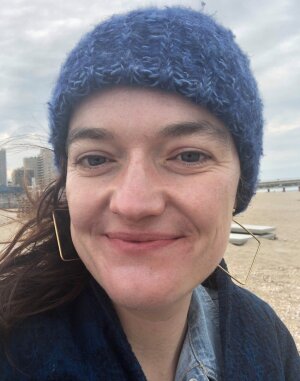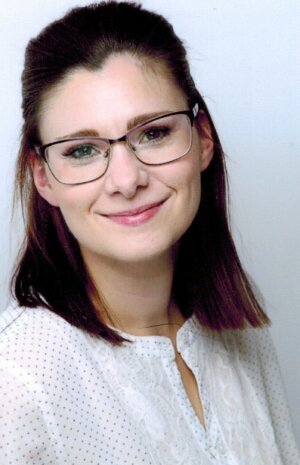Alumni
Sophie Boeschoten
Image: Sophie BoeschotenSophie Boeschoten from the Netherlands finished her Master in Caucasus Studies at the FSU Jena.
Why did you study at our institute?
I studied at the department of Caucasus Studies because I wanted to specialize in foreign policy and especially in the Caucasus region. Jena was the only city in Europe that offered this opportunity.
How did you profit from your studies?
First of all, I gathered beautiful memories. During my studies I spent one and a half year in Georgia. There, I travelled a lot and I have seen a lot. The study program itself was very intensive and instructive. Since only few students were enrolled in the Master program we had a lot of extra time at our disposal to deepen our knowledge in different areas. Upon finishing my studies I worked for some time in the developmental aid service in the Netherlands and Central Asia but did not like it that much (even though Central Asia was very beautiful!).
What do you do now?
Now I’m an artist. In Georgia, I took icon painting classes with one artist and he motivated me to prepare for the admission exam for the academy of arts. So in the end, it fits all together.
Mildred Gebert
Image: Mildred GebertMildred Gebert studied for DaF/DaZ (German as foreign / second language) and Caucasus Studies as BA and Caucasus Studies as well as Slavonic Languages and Cultures as MA (the latter at the University of Leipzig).
Why did you study at our institute?
Actually I did not have any specific underlying reason for why I studied Caucasus studies. I applied for DaF/DaZ (German as foreign / second language) and was looking for an additional minor subject for the BA. I could not find anything interesting in the list of offered programs. But then I discovered Caucasus Studies, which I had never heard of before. I first informed myself on the webpage of the institute and borrowed the book "Der Kaukasus: Geschichte-Kultur-Politik" (The Caucasus: History, culture, politics) from the university library (which I would recommend for a first contact with the region). Then I had a first meeting at the institute, I got very excited and decided to enroll.
Another reason for taking Caucasus Studies is the outstanding supervision by the lecturers. The institute is small with a very friendly atmosphere and stuff members are always available for help. In Caucasus Studies at the FSU Jena one finds solid expert knowledge that is backed by a long tradition as well as good contacts and relationships in every part of the world. The students are closely involved in the process of class planning so that course plans and schedules of lectures and seminars are adjusted to everyone’s needs timewise.
How did you profit from your studies?
Caucasus Studies is certainly one of the most varied subjects one can study. In addition to the (unbelievably many) languages and cultures, there are especially many aspects of political science in the region to be examined. Because of the possibility of setting focal points in the courses, one can deepen the area in which one is particularly interested.
In addition to Georgian and Russian, as well as Armenian, which one can study at the University of Halle, you learn how many languages can fit into such a small place.
I was particularly interested in political science. The political conditions are very diverse and sometimes also very tense. In the Caucasus, the world-wide political situation can sometimes be observed like under a magnifying glass. Many big actors play a role and attempts are made to influence the political processes of the nation states from many sides, often not to the advantage of the population.
And also with regard to the different cultures there are always new things to discover. I can only recommend everyone to visit the region, be it as a tourist or researcher. During my stays in Georgia and Armenia I have made many experiences that I would never want to miss. Apart from the unbelievable warmness and hospitality of the locals, the breathtaking landscape will of course remain in my memory. Besides the academic knowledge I gained through field research, I also learned all sorts of things for life: for example, how to skillfully avoid potholes when there is hardly any road left and avoid flocks of sheep, how to make wine and that absolutely every household always has the best quality wine, that I am far too much German to learn how to trade and negotiate on the market and that those who have the least give the most.
The only thing I have not managed to do so far was to pay for my food myself at least once when I am accompanied by Georgians.
What do you do now?
Who knows where life will take me, but right now I work in the hospitality industry. As it turns out, this is probably my dream job and I have certainly learned a lot from the hospitality in the Caucasus.
Anna Maria Kaim
Image: Anna Maria KaimAnna Maria Kaim finished her BA in Caucasus Studies
Why did you study at our institute?
Through a stay abroad in Lithuania and working there with refugees from the Caucasus, I became interested in the Caucasus region. And I wanted to deepen my knowledge during my studies. The Bachelor in Caucasus Studies at the FSU Jena was unique in Germany in its focus on the Caucasus, so I decided to enroll in Arabic Studies and Caucasus Studies in Jena.
How did you profit from your studies?
Through my studies I was able to broaden and deepen my knowledge and understanding of the Caucasus, the political and historical situation, the different languages and traditional fairy tales and stories. I was able to apply my Georgian language skills during a summer school and subsequently conduct my first field research in the north of Georgia. I could also use the scientific methods of literary studies and ethnography for my further career.
What do you do now?
Since 2017 I have been working on my doctoral thesis on the topic of "School and Family as Instances of Socialization in the Migration Society" at the Chair of Modern History and Historical Migration Research and at the Institute for Migration Research and Intercultural Studies of the University of Osnabrück.

